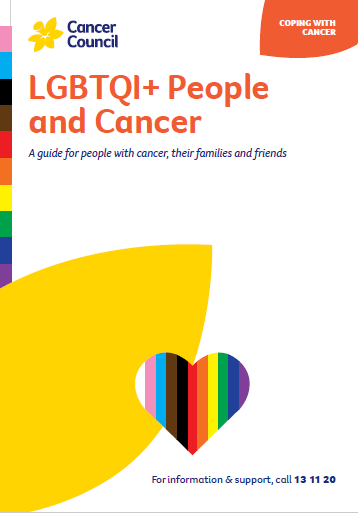- Home
- About Cancer
- LGBTQI+ People and Cancer
- Body image, gender and cancer
- Removal of a body part
Removal of a body part
Surgery to treat some types of cancer may mean removing a part of the body that affects how you look. For some, the surgery affirms their gender. After surgery, you may choose to live with your new body shape, wear a prosthesis or have a reconstruction. Only you can decide what feels right for you.
Learn more about:
- Loss of a breast
- Loss of the gynaecological organs
- Loss of a testicle
- Loss of the prostate
- Shortening or loss of the penis
Loss of a breast
Treatment for breast cancer may include breast conserving surgery (removing part of a breast) or a mastectomy (removing one or both breasts). Having a mastectomy is different from top surgery.
After a mastectomy, you may choose to have a reconstruction or “go flat”. Some people who go flat, decide to have the area decorated with a tattoo. This can be to cover scars or to help people feel that they are in control of their body and how they express themselves.
What you decide may depend on whether the surgery affirms your gender, and whether the changes mean your body aligns with how you feel it should be. You may feel that the treatment team assumes that you will want a reconstruction after a mastectomy. Talk to the team about your goals for treatment so they can work out the best options for you.
Visit Breast Cancer Network Australia for more information on body image and gender identity.
Loss of the gynaecological organs
If the ovaries, uterus or cervix are removed, this can affect how you experience sexual intimacy.
Loss of a testicle
Some people who have had a testicle removed, may have less confidence and feel less sexually desirable. For cisgender men, the loss of a testicle may make them feel less masculine.
Some people adjust quickly to having one testicle, while others find that it takes some time. If you are self-conscious about how your scrotum looks, you may want to consider having an artificial testicle (called a prosthesis) inserted.
Loss of the prostate
During surgery, the tubes from the testicles are sealed and the prostate and seminal vesicles are removed. This means semen is no longer ejaculated during orgasm. The pleasure from rubbing or stimulating the prostate during anal sex will also be lost.
Shortening or loss of the penis
After treatment for prostate cancer, your penis may be a bit shorter when not erect. After treatment for cancer of the penis, the penis may be removed (penectomy). If the size of your penis is affected, you might avoid intimacy for fear of rejection. Your health care team can recommend a range of methods to change how the penis looks.
For more on this, download Prostate Cancer Foundation of Australia’s booklet Understanding Prostate cancer for LGBTIQA+ people.
→ READ MORE: Weight and bowel changes
Meditation and Relaxation Podcast
Listen to more of our meditation and relaxation podcast for people affected by cancer
We thank the chief investigators from the Out with Cancer research project: Prof Jane Ussher, Prof Janette Perz, Prof Martha Hickey, Prof Suzanne Chambers, Prof Gary Dowsett, Prof Ian Davis, Prof Katherine Boydell, Prof Kerry Robinson and Dr Chloe Parton. Partner investigators were Dr Fiona McDonald and A/Prof Antoinette Anazodo. Research Associates were Dr Rosalie Power, Dr Kimberley Allison and Dr Alexandra J. Hawkey.
We thank the reviewers of our LGBTQI+ People and Cancer booklet: Prof Jane Ussher, Chair, Women’s Heath Psychology and Chief Investigator, Out with Cancer study, Western Sydney University, NSW; ACON; Dr Kimberley Allison, Out with Cancer study, Western Sydney University, NSW; Dr Katherine Allsopp, Supportive and Palliative Care Specialist, Westmead Hospital, NSW; A/Prof Antoinette Anazodo OAM, Paediatric and Adolescent Oncologist, Sydney Children’s Hospital, NSW; Megan Bathgate, Consumer; Gregory Bock, Clinical Nurse Consultant–Oncology Coordinator, Urology Cancer Nurse Coordination Service, WA Cancer & Palliative Care Network, WA; Morgan Carpenter, Executive Director, Intersex Human Rights Australia (formerly OII Australia); Prof Lorraine Chantrill, Medical Co-Director Cancer Services, Illawarra Shoalhaven Local Health District, NSW; A/Prof Ada Cheung, Endocrinologist, Head, Trans Health Research Group, Department of Medicine (Austin Health), The University of Melbourne, VIC; Bonney Corbin, Australian Women’s Health Network; Cristyn Davies, Research Fellow, Specialty of Child and Adolescent Health, Faculty of Medicine and Health, The University of Sydney and Children’s Hospital Westmead Clinical School, NSW; Prof Ian Davis, Professor of Medicine, Monash University and Eastern Health, Medical Oncologist, Eastern Health, Chair, ANZUP Cancer Trials Group, VIC; Rebecca Dominguez, President, Bisexual Alliance Victoria; Liz Duck-Chong, Projects Coordinator, TransHub and Trans Health Equity, ACON, NSW; Lauren Giordano, 13 11 20 Consultant, Cancer Council NSW; Hall & Wilcox (law firm); Natalie Halse, BCNA Consumer Representative; Jem Hensley, Consumer; Prof Martha Hickey, Professor of Obstetrics and Gynaecology, The University of Melbourne, and Director of the Gynaecology Research Centre, The Women’s Hospital, VIC; Kim Hobbs, Clinical Specialist Social Worker – Gynaecological Cancer, Westmead Hospital, NSW; Dr Laura Kirsten, Principal Clinical Psychologist, Nepean Cancer Care Centre, NSW; Amber Loomis, Policy and Research Coordinator, LGBTIQ+ Health Australia; Julie McCrossin and Melissa Gibson, Consumers; Dr Fiona McDonald, Research Manager, Canteen, NSW; Dr Gary Morrison, Shine a Light (LGBTQIA+ Cancer Support Group); Penelope Murphy, Cancer Council NSW Liaison, Prince of Wales Hospital, NSW; Dr Rosalie Power, Out with Cancer study, Western Sydney University, NSW; Jan Priaulx, 13 11 20 Consultant, Cancer Council NSW; Paul Scott-Williams, Consumer; Simone Sheridan, Sexual Health Nurse Consultant, Sexual Health Services, Austin Health, VIC; Cheryl Waller and Rhonda Beach, Consumers.
View the Cancer Council NSW editorial policy.
View all publications or call 13 11 20 for free printed copies.
